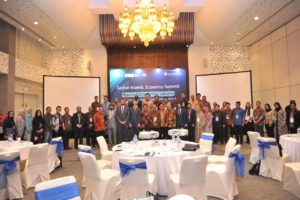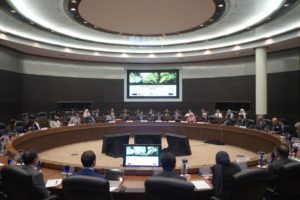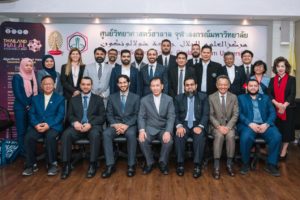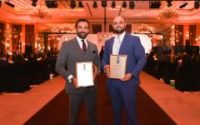Dubai Islamic Economy Development Centre Explores Collaboration Within The Islamic Economy Sectors Of Southeast Asia
Dubai Islamic Economy Development Centre (DIEDC) concluded a series of roundtables in Malaysia, Indonesia, and Thailand in collaboration with prominent entities operating within the Islamic economy framework in the three host countries.
Saeed Mubarak Kharbash Al Marri, Deputy CEO of Strategy and Planning at DIEDC, headed the UAE delegation that comprised representatives of the Centre’s strategic partners. These included Dubai Airport Freezone Authority (DAFZA), Dubai Multi Commodities Centre (DMCC), the United Arab Emirates University (UAEU), DinarStandard, the Responsible Finance and Investment (RFI) Foundation, and BSA Ahmad Bin Hezeem & Associates LLP.
The first Southeast Asian roundtable took place in Malaysia’s capital city, Kuala Lumpur. Hosted by Bank Negara Malaysia with the aim of enhancing the role of Islamic finance in achieving the United Nations’ Sustainable Development Goals, the session drew the participation of the RFI Foundation, of which DIEDC is an observer member, as well as HSBC Amanah Malaysia Berhad, the Institutional Investors Council Malaysia, and Bank Islam Malaysia Berhad.
The roundtable focused on two main topics – the role of financial institutions in developing operational frameworks and managing the social and environmental impacts of their finance and investment arms, and ways for financial institutions to improve their crisis management capabilities while attracting and retaining international fund managers interested in sustainable social and corporate governance.
Jakarta, the capital of Indonesia, hosted the second roundtable that explored ways to transform the country with the largest Muslim population in the world into a key driver of the global halal industry. Participants included representatives of the Ministry of Foreign Affairs of Indonesia.
The final roundtable of the series took place at The Halal Science Center, the largest entity of its kind worldwide, located at Chulalongkorn University in Bangkok, the capital of Thailand. The agenda focused on Thailand’s success story in developing the halal industry through establishing some of the world’s leading halal hotels and resorts, and adopting a halal governance system adhering to the highest international standards. Following the session, the participants toured The Halal Science Center to experience its best practices first-hand.
Abdulla Mohammed Al Awar, CEO of DIEDC, said: “The roundtable series reinforced the relationship between DIEDC and Islamic economy stakeholders in Southeast Asia. The initiative provided an ideal platform for the exchange of knowledge and experiences as well as identifying new opportunities for cooperation in developing the Islamic economy.”
He added: “We seek to continue hosting such conversations that reaffirm our commitment to collaborating with leading countries within the Islamic economy. We are keen to build new partnerships that can help us develop the Islamic economy sectors, and boost inclusive and sustainable growth on a global scale.”
For his part, Saeed Mubarak Kharbash Al Marri said: “Southeast Asia plays a fundamental role in strengthening the Islamic economy worldwide and raising awareness about its importance. The region includes several non-Muslim-majority countries, and yet, it has significantly contributed to the advancement of the Islamic economy. This validates the fact that the Islamic economy is not just limited to Muslim consumers or investors but serves all segments of society and supports economic diversification.”
He added: “Through offering feasible solutions to global financial and economic challenges, Dubai has become a role model in realising the full potential of the Islamic economy. The Southeast Asia roundtable series aimed to unify efforts to fast-track the growth of the Islamic economy while forging productive synergies with new players in its key sectors.”
Amna Lootah, Assistant Director General of DAFZA, said: “Malaysia, Indonesia, and Thailand are among the fastest-growing economies in the world, and offer promising business opportunities in several sectors, especially those related to halal products, such as food and beverage, cosmetics, and pharmaceuticals. The roundtables contributed to positioning Dubai as the main gateway for halal trade and achieving the vision of His Highness Sheikh Mohammed bin Rashid Al Maktoum, Vice President and Prime Minister of the UAE and Ruler of Dubai, to establish the city as the capital of the Islamic economy.
“In line with DAFZA’s Strategy for Islamic Economy, the series provided us with a platform to introduce the Halal Trade and Marketing Centre (HTMC) – a global business development hub that focuses on maximising opportunities within the halal sector. Our latest value proposition for this market aims to drive growth within the industry. We are confident that Southeast Asian companies that seek to do business in the MENA region can benefit from HTMC’s services. The Centre’s extensive partner network enables members to access new opportunities within the sector and promote global halal trade.”
Sanjeev Dutta, Executive Director of Commodities and Financial Services at DMCC, said: “Owing to its strategic location at the crossroads between East and West, Dubai is fast becoming the Islamic finance capital of the world. In line with its commitment to strengthening this status, DMCC continues to develop its sharia-compliant product and service offering to facilitate trade and enhance the emirate’s appeal to international businesses.”
He added: “Our enabling platforms, such as the Dubai Gold & Commodities Exchange (DGCX), Dubai Shariah Asset Management (DSAM), and DMCC Tradeflow, provide a trusted and transparent trade infrastructure for the Islamic finance industry.”
Dr Mutamed Ayyash, Associate Professor of Food Microbiology at UAEU, said: “The participation of UAEU’s College of Food and Agriculture (CFA) in the Thailand roundtable testifies to the university’s keen interest in implementing the vision of the UAE leadership in promoting the halal industry globally.”
Blake Gould, CEO of the RFI Foundation, said: “The RFI Foundation was proud to co-host the roundtable in Malaysia that focused on a timely topic – the need to change mindsets at a high level to drive new action on responsible finance. We believe this is a key opportunity and an imperative for Islamic finance.”
Ibn Arabi El Goni, Head of Product at Salaam Gateway, said: “The palpable growth momentum of the Islamic economy in Southeast Asia was apparent from our engagement with policymakers and the business community. Our learnings from the roundtable series will now inform our work on Salaam Gateway. They have inspired new ideas on how we can better serve the Islamic economy, such as more extensive and in-depth editorial coverage, as well as an enhanced content strategy.”
Rima Mrad, Partner at BSA Ahmed Bin Hezeem & Associates LLP, said: “Ethical and sustainable corporate governance, sustainable and responsible investments, and halal investments are extremely important for social development. Governments around the world must promote these approaches through providing incentives to companies that adopt them. They need to establish comprehensive legal frameworks in this regard to avoid any adverse impacts, particularly due to the introduction of artificial intelligence platforms to support informed decision-making through providing all the relevant information to investors.”
Fateh Ali, CEO and Co-founder of CollabDeen, a cutting-edge technology startup headquartered in Singapore, said: “As a technology founder, I found it helpful to understand the challenges we have in common and discuss approaches to resolving them using deep tech, as technology connects people and brings a wealth of advantages. These roundtables also provided me with an opportunity to start forging relationships with government, policymakers, and community builders.”









